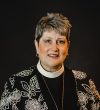- Communities across the ELCA, such as First Lutheran of Crystal in Brooklyn Park, Minn.,are measuring congregational vitality in different ways through grants awarded by Lilly Endowment Inc.’s Thriving Congregations Initiative. Photo: Nicholas Tangen
- The Minneapolis Area Synod received a Lilly grant for just under $1 million. The leaders of 13 participating congregations gather monthly as a cohort to share what they’re learning about what makes a congregation vital or thriving. Photo: Kristin Tangen
- First Lutheran of Crystal, one of the 13 congregations, held cookouts at the church. When several members brought their classic cars and parked them in the parking lot, it inspired interest from neighbors. At each cookout, more classic cars showed up. Photo: Nicholas Tangen
Editor’s note: Part one explored how a grant awarded by Lilly Endowment Inc.’s Thriving Congregations Initiative has impacted St. Olaf College’s Nourishing Vocation Project.
In the Minneapolis Area Synod, which also received a Lilly Endowment Inc. grant for just under $1 million, 13 congregations are focusing on two areas that make a congregation vital or thriving: authentic relationship with the neighborhood and space for lifelong learning.
The participating congregations are digging into concrete practices—prayer, lectio divina, house meetings and storytelling—to give them the tools to step outside of the walls of their churches into their neighborhoods.
In many ways, the work is amplifying things congregations were already engaging in.
“If I had to describe what we’re doing in one word, it would be listening,” said Nicholas Tangen, the synod’s director of faith practices and neighboring practices and project facilitator. “It’s getting congregations to be more intentional [about] listening to God in prayer and Scripture, bringing in an extra level of intentionality, learning to listen to our neighbors rather than thinking of them as problems to be solved.”
Leaders of the congregations are gathering as a cohort once a month for two years to share what they’re learning.
“For some of our congregations, this is new work, especially the neighborhood side of things,” Tangen said. “For others, they’ve been in the neighborhood for a while and bring a lot of wisdom to the cohorts.”
During summer 2022, each congregation engaged in three months of neighborhood listening. Each decided how it would hold space to build relationships.
One congregation, First Lutheran of Crystal in Brooklyn Park, Minn., held cookouts at the church. When several members brought their classic cars and parked them in the parking lot, it inspired interest from neighbors. At each cookout, more classic cars showed up.
“This work actually contributes to a sense of aliveness, what it means to feel like a congregation that feels alive.”
“It became this informal car show in the middle of this neighborhood,” Tangen said. “Neighbors were curious, came out, including some high school students. It became a catalyst for that congregation.”
Tangen calls this a success story because it invites members of congregations to be the neighbor, not just to serve the neighbor.
In a culture in which we often measure success in numbers, Tangen said the work the synod is doing makes “success look more like depth of relationship rather than the breadth of our reach.”
“We’ve talked about how we approach the neighbor mirrors how we approach God in prayer—transactionally—and we do that with our neighbor as well.” He said the shift is in “resting or living in love of God, not what can God give me and what I can give to God.”
Tangen said leaders realize that culture change and building trust takes a long time. “A lot of these projects have a sense that you’re building some, and fertilizing some, soil that will last for a while,” he said.
Taking the time to fertilize might seem difficult for many churches “because the narrative of decline is so rampant,” he said. “The first thing people ask is, ‘What are we going to get? How will this help us?’ We’ve been so socialized as church to look at churches in numbers, and it takes a little time to convince folks to actually slow down and realize that their end goal isn’t survivability.”
When congregations focus too exclusively on growing numbers or developing flashy programs, he said, “it contributes to decline because it doesn’t bear authenticity.”
“We do say this work actually contributes to a sense of aliveness, what it means to feel like a congregation that feels alive,” Tangen said. “Once folks get into experiences of depth, this actually does contribute to the vitality of our congregations, but it seems counterintuitive to slow down, do less, focus on fewer people but focus on them intently.”
The Lilly Endowment awarded nearly $93 million in 92 grants through the Thriving Congregations Initiative, including grants to the ELCA; the Indiana-Kentucky, Minneapolis Area and Oregon synods; St. Olaf College; Augsburg University in Minneapolis; and Calvary Lutheran Church in Alexandria, Minn.






